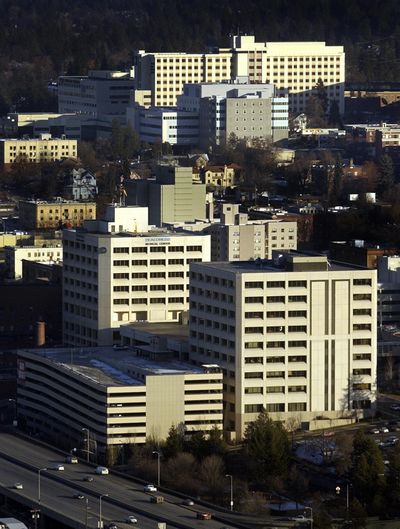Decade in review: More insurance, more consolidation, more medical education in Spokane

Health care has undergone dramatic changes in the Spokane region, from new provider groups entering the market to the expansion of medical education east of the Cascades. The landscape of health care in the community looks significantly different than it did a decade ago.
Washington state approves Medicaid expansion (2013-14)
After Congress approved the Affordable Care Act, states could voluntarily expand Medicaid coverage, and Washington state was one of 27 states that initially chose to do so in 2013. By 2014, Washington’s uninsured rate dropped from 14% to 8%.
In Spokane County, Medicaid expansion opened up health insurance to thousands of people. The uninsured rate in Spokane County was 14% in 2011 and dropped to just 4.3% by 2017. As of August 2019, more than 1.8 million Washington residents including children and adults have Medicaid, and in Spokane County, nearly 160,000 adults and children have Medicaid coverage.
MultiCare buys Rockwood Clinic, Deaconess and Valley hospitals (2016-17)
MultiCare entered the Spokane health care industry with a force, paying $425 million for the Rockwood Clinics as well as Deaconess and Valley hospitals. The deal meant the departure of Community Health Systems, a Tennessee-based health care company that merged the hospitals with Rockwood to compete with dominant Providence Health Care.
Providence expands to Spokane Valley (2012-14)
Providence announced its intention to build a large medical campus in Spokane Valley, complete with an urgent care center, a branch of the heart institute and several specialty labs. The move led to some politicking, after Providence initially received an exemption from the Certificate of Need process, the state system of approval for new health care buildings, with Valley Hospital appealing. In 2014, the $44 million Providence Medical Park opened just off Interstate 90 in Spokane Valley.
Empire Health Foundation sues Community Health Systems and wins (2017-19)
In 2017, the Empire Health Foundation sued Community Health Systems, which operated Deaconess and Valley hospitals from 2008 to 2017, for failing to provide enough charity care as agreed to when it bought the two hospitals. After a two-year legal battle, CHS agreed to forgive up to $50 million in medical debt in a 2019 settlement agreement, which will benefit about 17,000 former patients who received treatment at the two hospitals from 2008 to 2017.
WSU College of Medicine opens, begins educating doctors (2017)
After years of political maneuvering and some successful lobbying, WSU pulled out a “W” in the medical Apple Cup, opening its own medical school in Spokane in fall 2017. With a focus on family medicine and the mission of educating doctors who will practice in Eastern Washington and rural parts of the state, WSU will graduate its first class of doctors in 2020.
Gonzaga partners with UW (2019)
The University of Washington and Gonzaga University announced an expansion of their health sciences partnership beyond the Gonzaga campus, where the UW Medical School WWAMI Program holds classes. The two universities will offer undergraduate and graduate medical programs in a four-story, 80,0000-square-foot building on East Spokane Falls Boulevard.
Measles outbreak, vaccine exemptions on the rise (2019)
In 2019, Washington state experienced two outbreaks of measles through August, with 87 confirmed cases, more than the state has had since 1990. Lawmakers cut the personal or philosophical exemption for measles, mumps and rubella vaccines in the state in response, and by fall 2019, school-age children would need to have the MMR vaccine or a new exemption on file. About 8% of students in Spokane County have an exemption on file to any vaccine, with the majority of those being personal exemptions.